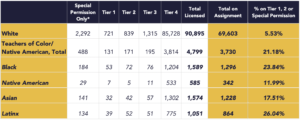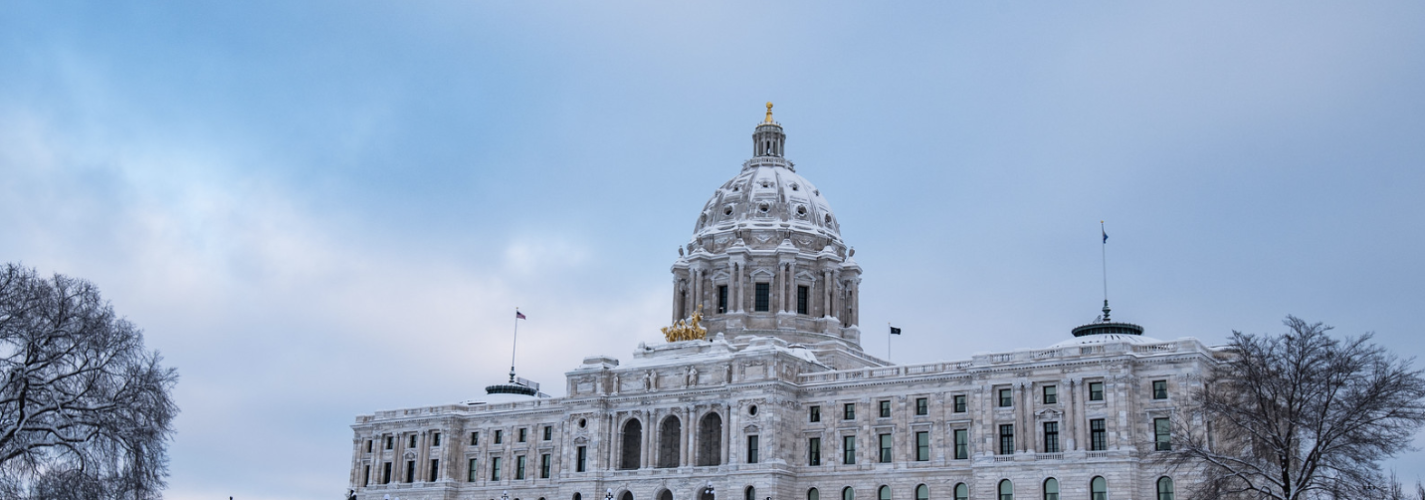EdAllies’ 2020 Priorities at the Capitol
By Josh Crosson
The 2020 legislative session starts today, and policymakers have already identified their top priorities for the year. At EdAllies, we’re excited and ready to advance policies that ensure every student in Minnesota succeeds in a rigorous and engaging education. Here are a few of the priorities we’ll be tackling this year.
Preserving Tiered Licensure
All students deserve an excellent teacher, but once again, legislators are considering changes to tiered licensure that would create unnecessary barriers to a Minnesota teaching license. These changes would have a devastating impact on teachers of color and career and technical education teachers who are more likely to enter the profession on Tier 1 & 2 licenses. EdAllies will continue fighting to ensure schools can hire the best teacher for the job, and that licensure changes don’t undermine efforts to increase teacher diversity.
All Licenses and Permissions, By Category & Race/Ethnicity, 2018-2019

Data from PELSB Data Request, August 12, 2019.
Expanding Teacher Preparation Pathways
To diversify and strengthen the teacher pipeline, Minnesota must offer a variety of pathways to the classroom. The Alternative Teacher Preparation Grant program, established in 2017, has already helped seed new programs working to diversify the teacher workforce and fill shortage areas, including an initiative focused on special education through the Learning Disabilities Association and a Lakes Country Service Cooperative program to increase the pipeline of CTE teachers in Greater Minnesota. Policymakers should reinvest in this successful grant program while also amending the Collaborative Urban and Greater Minnesota Educators (CUGMEC) so alternative teacher preparation programs are eligible for the same funding as any other state-approved teacher preparation program.
Reforming School Discipline
We know that exclusionary disciplinary practices have a negative impact on academic achievement. To tackle our state’s ongoing achievement gaps, we need to address the disproportionate dismissal rates facing students of color and students with special needs and keep kids in class where they can learn. The need is clear:
- Native American students in Minnesota are 10 times more likely to be suspended or expelled than their white peers.
- Black students in Minnesota are eight times more likely to be suspended or expelled than their white peers.
- Students with special needs represent just 14% of Minnesota students, but receive 43% of all suspensions and expulsions.
We will continue to work with parents, students, and our partners in the Solutions Not Suspensions Coalition to advocate for the Student Inclusion and Engagement Act and parental notification rights. Additionally, we will work to eliminate seclusions and dismissals for pre-kindergarten students. By improving transparency, accountability, and parental involvement around discipline, strengthening student due process, protecting our youngest learners, and more, these policies will help to keep our students in the classroom.
Overhauling the MN School Report Card
Families should have clear information on how schools are serving kids. Over the past several years, many states have modernized their school data websites to make them more accessible and understandable for parents and the community, but Minnesota continues to lag behind with a labyrinthine, confusing school report card. Having transparent, accessible data on academics, funding, climate, staffing, and more allows families to celebrate their school’s successes, advocate for changes and resources, and understand the school options in their local community. Minnesota families deserve access to basic data about our schools, and it’s time to invest in an updated school report card.
Improving the MCAs
The Minnesota Comprehensive Assessment is our state’s only standards-based assessment that lets us know whether students are proficient in reading, math, or science. Required by federal law, the MCAs give students, families, schools, and policymakers objective and comparable information on student proficiency and growth that they can’t get from other tests like the ACT. We need to make these tests as meaningful as possible to both educators and families. Last year, the Legislature worked to ensure tests are administered as late as possible in the school year so that they measure a full year of learning. Another important fix is to ensure families, students, and teachers have access to results right away rather than months into the following school year. Policymakers should make this a priority this session.
Supporting Parent Choice & Charter Quality
All families—no matter their race, zip code, income, disability, or background—deserve access to a high-quality school that meets the needs of their children. For some students, charter schools offer a more tailored and relevant approach to learning. They also offer another public option for students who aren’t being well-served by their zoned school. In fact, Minnesota charter schools serve larger proportions of low-income students, English learners, and students of color than the statewide averages. Some legislators are talking about a charter moratorium, which would take us in the wrong direction by blocking options students rely on to succeed. Minnesota leaders should acknowledge the important role charter schools play and shift the conversation to quality. Policymakers should lead a meaningful conversation about flexibility and accountability, and specifically how charter school authorizers can play a stronger role in supporting school quality.
Funding Special Education
Students who need special education services must be supported no matter the school they choose to attend—whether through effective services in community schools or through tailored programming at schools of choice. Underfunding at the state and federal level has put significant strain on schools and districts, and should be a top priority for legislators seeking to invest in our schools. At the same time, policymakers should be sure to hold students harmless regardless of whether they attend their district school, open enroll into a different district, or a charter school.
Eliminating Lunch Shaming
All students deserve to have a meal at school without shame or punishment. Unfortunately, some schools continue to use practices that stigmatize, embarrass, and demean students who may not be able to afford a lunch. We are working to make sure students are never targeted for lunch debt—by better defining shaming and holding schools accountable for harmful practices.
What You Can Do
EdAllies is working hard to advance the interests of Minnesota’s students, with a focus on students of color, students with disabilities, low-income learners, and other students from communities that have been historically underserved. As session picks up, we’ll need advocates like you ready to take action. Over the next few months, we’ll use social media, our blog, and email to share opportunities to understand and act on emerging policy proposals, so stay tuned!

